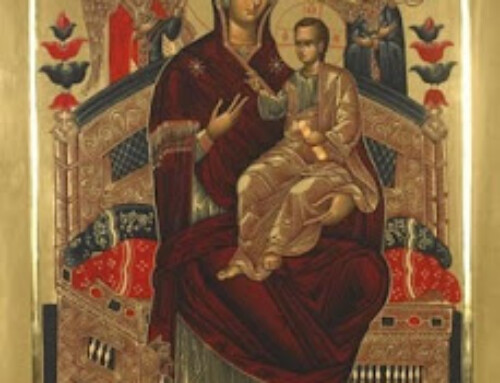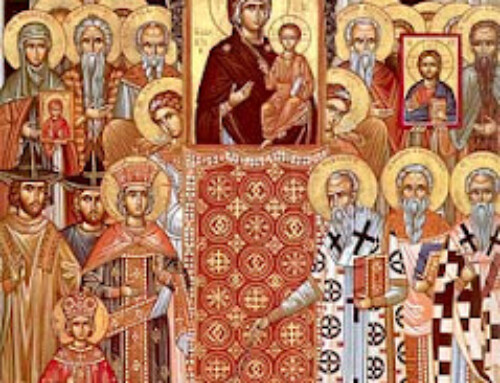Word Magazine May 1978 Page 5-7/15
MARRIAGE, FAMILY AND
CHRISTIAN EDUCATION
By John L. Boojamra
The family, regardless of its quality, is what we all have in common. The difficulty is compounded when we consider that in the rearing of children no one likes to be advised or told how to proceed. Added to the difficulties is the almost universal complacency of audiences when the subject turns to Christian education and family.
Everyone is prepared to affirm the importance of the family. What is not clear, however, are the reasons for this importance. It has been my experience that the centrality of the family is interpreted in terms of parental authority over rebellious youngsters. Needless to say, this approach is inadequate to a creative understanding of Orthodox Christian family life. The role of the family in Christian education must be taken beyond the level of the pious, though general, affirmation of its importance.
At the same time that we Christians affirm the absolute centrality of the family to the Christian nurture of children, we are confronted with a general decline of family life. The family structure and the very notion of permanent relationships seem to be giving way to a world of rapid social and moral change — sexual promiscuity, free love, easy divorce, communal experimentation, and in general what can be characterized as “future shock.” The failure of much of family life, the failure of husbands and wives to adequately meet each others various needs without exploitation, is part and parcel of the failure of the family to provide its younger members with a Christian milieu in which to grow. Both are functions of the much more fundamental failure to live consciously in the presence of God and to establish this consciousness as a common goal of the family unit and the subsequent failure to direct its efforts and orient its attitudes towards that goal.
It is indicative of the disintegration of the family that it has ceased to perform certain functions which have been traditionally ascribed to it. Many of those traditional family functions have of necessity devolved upon other agencies — for instance, we no longer raise our own food and we no longer face the necessity of maintaining a large family unit to work a farm. This is all fine and good and no one in his right mind would suggest a movement back to the so-called simpler days. It is unfortunate, however, that the loss of many of these economic functions seems to have converted the family, in the minds of many people, into a vestigial social agency; this would perhaps be true if we accepted that interpretation which sees the family as essentially an economic agency. It is not; but the North American family has behaved as if the loss of these functions has robbed it of its meaning. It has, with the old economic functions, given up others, especially in the realm of education (e.g., sex education) and discipline.
Into the vacuum of uncertainty a new vision of the American family is being put forward; the image is provided by the media and advertising. The family less and less is defined in Christian terms or for that matter in biological terms, sexual needs seemingly being adequately satisfied outside of traditional family life. The family is defined in commercial terms. American affluence sees the family as a consumer of those commodities which the greatest manufacturing system in history is capable of producing in quantities far beyond the level of satisfying basic human needs. Needless to say this is hardly an elevating view of the family — consuming things it neither needs nor wants. Yet, in spite of all this and the “future shock” we are assured by certain sociologists that the family will survive and that individuals will continue to seek out a one-to-one relationship in the traditional marriage structure. Alvin Toffler points out in his Future Shock that the nuclear family as we know it will survive as one among an increased number of life-style options. It is precisely this increased number of options which provides the challenge for Christian parents since the Church — throughout almost two thousand years of history has endorsed only two options — marriage between a male and female and monastic celibacy.
Church As Way for Christian Living
The role of religion as an agent influencing family life has been waning for many years. In brief, all churches are experiencing the fact that their members in general do not actively demonstrate their faith in their everyday lives. Unhappily, there seems to be no demonstrable connection between religious life on Sunday and the family life on Monday. On a more general level, sociologists have sought in vain for a significant correlation between church membership and ethical conduct. For the purposes of this discussion, the Church exerts less of an influence on the family than do other forces. The North American family does not see itself in the light of Christian categories.
In the face of this social and religious disruption of the family, we must affirm that the Church has always taken the family very seriously and has concerned itself with the quality of family life, seeking to influence it along very distinct lines. Why this is so will, I believe, lead us to a deeper understanding of the nature of the Christian family and its role as the primary “educator.” First, the emphasis on the family as a social structure is based on the understanding that Christian life grows and is worked out not in a vacuum but in concrete, human situations which are stable and reliable. Second, spiritual and moral life is challenged and fulfilled in interpersonal encounters, in community situations. Third, the Church, which is itself the archetype of all communities, understands communal relationships as fundamental to all human life and the quality of communal life as fundamental to the quality of the spiritual and moral growth within that structure. Now these three points are all interrelated and perhaps make the same point. The New Testament emphasizes that it is the love of our neighbor which is the pattern of our love for God, and vice versa. St. James writes that if we say we have love for God, but do not love the people with whom we come into contact every day, then we are simply liars. Man is man, and Christian man is Christian man, when he is in relationship to other men and to God. This two-fold understanding, that is our relationship to God and to other men, is fundamental to any understanding of Orthodox moral and spiritual life, including the nature of the family and Christian nurture within the family.
If we look at the Church’s history we can see this social concern clearly reflected. It is a belief that life, to use educational jargon, is a learning situation. On this basis, with this intuition, the Church has sought to establish and stabilize those situations which are most conducive to Christian growth and the development of Christian personality. The Church throughout her history has tried to change the society of which she was part, not by great revolution, which by their nature are ambiguous, but by slowly transforming certain aspects of society —marriage relationships being just one.
The Example of Monasticism
Now let us look at a more limited and formal structure before affirming the same principles for the family. Monasticism will allow us to see this a little more objectively since most of us are not directly involved with it. In the Church’s history there have been two types: the loner or the hermit variety is probably the earliest, dating from the very first centuries of the Church, and the communal type in which men or women live together in a structured relationship of worship, work, and service. The latter pattern has become the norm in the Orthodox Church: allowing for the special vocation of the hermit, the Church has canonized the communal monastic life as the type most suitable to the nature of men and to the formation of the Christian life. In a real sense, it is as St. Basil the Great said, “If I live alone whose feet can I wash?”
The family like the monastic community has been endorsed by the Church as a style of life generally conducive to the creation of an environment in which Christian growth can most fruitfully take place. It is again an affirmation that the Christian faith and the Christian life cannot grow, or be lived, or be communicated in a vacuum, because it cannot exist in a vacuum. It is in the family that the child, as it were, will “catch” Christianity as it is actually lived. He will not absorb abstraction, he will absorb life; in a real sense, we cannot teach Christianity, we must rather be Christianity. The parents are the sign through which the child begins to form his first ideas of God as good, accepting, and forgiving. In the family the child will hopefully learn forgiveness and love, not because he is told about them but because he sees them and experiences them. He will learn of the essential goodness of sex not from those well-intentioned sex education courses, but from the family where sex as an overall and total relationship between a man and a woman, a husband and a wife, has its natural and authentic setting and where it is associated with joy and suffering, a mutual self-giving in and out of the bed. The passing on of the faith is, in a real sense, a mysterious enterprise which does not conform to the laws of pedagogy and cannot be identified with teaching about Orthodoxy. We are in the most fundamental sense teaching not about the Christian life, but teaching that very life itself. Once this is, however, absolutely clear in this process, any parent who wants to pass on the faith to his children must face the iron law of giving — you cannot give what you do not have yourself. I have consciously avoided the more limited reference to Christian education in the sense of a formal learning situation, teachers, and textbooks. Unfortunately, the larger definition of life as the learning situation may allow some a sigh of relief as specific responsibility seems to disappear within the cloud of people with whom the child comes in contact. In fact the description means quite the opposite; it is an effort to take the responsibility out of the hands of the church school and put it where it belongs, with the family. It is the parish’s responsibility to give the parents the necessary tool, confidence, and support to do the job that is by nature theirs.
Developing Religious Insights: Three Points
For the purposes of our discussion, I would like to refer to a study completed in England by a religious education specialist, Ronald Goldman, and published in his book Religious Thinking from Childhood to Adolescence (New York: Seabury Press, 1968). Goldman’s study affirms that the church school does play a role in Christian formation, but only a minimal one. The relationship between church school attendance and growth of “religious insight” though it is positive is not significant. His conclusions: few children who attend church school regularly achieve high “religious insights,” and many children who attend church school are not religiously motivated nor do they develop the ability to think with “religious insights.” As a corollary to this conclusion, Goldman discovered that the determining factor in the development of this ability to think with “religious insights” was the supportive role of the family members, which, for his purposes, was demonstrated by Church attendance. Children, according to Goldman’s findings, do imitate their parents. Something we have all been saying for a long time.
We are here discussing specifically the early childhood years, but much of this is applicable to older children. During this period the family performs or should perform certain very distinct functions which can be summarized for our purposes under three categories. First, and perhaps foremost, the family provides a stable environment of security, confidence, and love. All of which are indispensable not only to a normal emotional life but to the normal development of a mature faith-life. The ability to trust mommy and daddy is directly related to the growth of ability to trust God as essential to a mature spiritual life. For many parents this is certainly an uncomfortable conclusion, but one which is well supported both psychologically and theologically. Here is where the notion of and the relationship to God as “Our Father” becomes a living possibility. I think many of us are familiar with the aspect of Freud’s understanding of religion in which God is reduced to a great “father-image.” The Church has always intuited this sort of relationship, but in the reverse; in the family the father is, in fact, the God-image, as inescapable and uncomfortable as that may be.
Second, the family assists the child’s growth in faith by appropriate reflection on subjects as the occasion arises — a beautiful day, trees, a new baby, the dinner table, animals, etc. We must, of course, be careful to avoid giving the child, especially in the so-called formative years, a mistaken notion of Christianity. Again, referring to Goldman, it is important not to force the child too early into a formal learning situation which will channel his thinking into words and crystallize it into inflexible concepts such as a God with a big white beard sitting on a throne in a place in the sky called heaven, dealing out rewards and punishments. In general, it is true that a child will attempt to simplify anything he cannot understand; the process of simplification often results in a distortion. We are all familiar with the religious malversions which include such confusions as “Harold by Thy name” (“Hallowed by Thy name”) and the story of how the three angels visited Abraham Lincoln in the White House. While these may be very cute, they also are very telling as to what children can handle conceptionally in the pre-school years. Unhappily some Christians never overcome these simplifications and the distortions in a real sense lead to a terribly stultified spiritual life.
Third, the family can consciously attempt to create an environment where the child is initiated into certain “religious” activities which carry with them no formal explanation and no attempt is made to have him understand them. Remembering that his understanding is limited, we can reach the child with his normal learning tool — his body and senses. The child can be taught to make the sign of the cross, to recite certain simple prayers such as “I love you, Jesus” or “Thank you for this or that.” Little family rituals, which are very often some of our most cherished childhood memories, can be created — lighting candles before an icon on Saturday night or on a holiday, family Communion, prayers before meals, common church attendance, and blessing baskets on Easter and fruits on Transfiguration. From this point of view active participation in what can be described as the multimedia Orthodox liturgical life is a natural. The focus of Orthodox liturgical experience is very often non-verbal and filled with movement, with colors, with lights, and intimacy — all of which provide the child with a total “sensational” atmosphere which is quite self-evident and in need of no explanation. This perhaps clarifies for us where our emphasis should be placed in our family and parish and educational efforts.
Responsibility In the Family
Before closing, it is necessary to say a few words about the distribution of responsibility within the family structure. Many people consider religion and religious instruction as the exclusive responsibility of the mother; it is somehow interpreted as women’s work. This is a serious error and a mistake for the healthy development not only of the child’s spiritual life, but of his emotional life as well. Too often in the American situation the child sees his father infrequently and comes to rely almost totally on his mother for the satisfaction of emotional and spiritual needs. We must, from a specifically Christian motivation, begin to think in terms of a rebalancing or redistribution of familial responsibilities in a more flexible manner.
It is not, I believe, sentimental to claim that the child, at any age, will learn nothing but religious cynicism unless he sees the Christian life, which he learns about in the church school alive and well in his own home. We cannot expect any authentic Christian education without the family; we must forget about the church school relieving the parents of the responsibility for Christian development — it hasn’t worked and it won’t work; such an approach is in fact counter productive. (We have realized that church schools and text books, no matter how adequately they conform to the needs of the students and the needs of the material, are by their very nature inadequate to the development of the Christian faith-life in our children.)
The Church must seek to offer to Orthodox married couples, both young and old, the possibility of and necessary direction for the shaping of their marital lives around the life of the Church. We cannot speak honestly of Christian education unless we are willing to make the effort to rebuild our family life as the place where Christian growth, the growth of a faith-life, has its origin and sustenance.
Dr. John L. Boojamra is Director of the Department of Christian Education of the Archdiocese.




